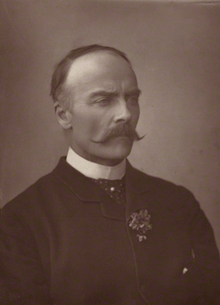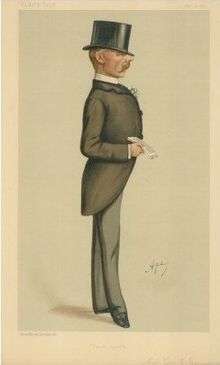Edward James Saunderson
| The Right Honourable Edward James Saunderson JP, DL | |
|---|---|
 Photograph of Saunderson, taken 1891 | |
| Leader of the Irish Unionist Alliance | |
|
In office 1891–1906 | |
| Succeeded by | Walter Long |
| Member of Parliament for North Armagh | |
|
In office 18 December 1885 – 21 October 1906 | |
| Preceded by | Constituency created |
| Succeeded by | William Moore |
| Member of Parliament for Cavan | |
|
In office 23 July 1865 – 31 January 1874 Serving with Hugh Annesley | |
| Preceded by |
James Maxwell Hugh Annesley |
| Succeeded by |
Charles Joseph Fay Joseph Biggar |
| Personal details | |
| Born |
1 October 1837 Castle Saunderson, Ireland |
| Died |
21 October 1906 (aged 69) Castle Saunderson |
| Resting place | Castle Saunderson churchyard |
| Citizenship | British |
| Political party | Irish Unionist Alliance |
| Other political affiliations |
Irish Conservative (until 1891) Liberal (until 1874) |
| Spouse(s) | Helena Emily |
| Children | 5 |
| Parents | Alexander Saunderson & Sarah Juliana |
| Religion | Anglican |
| Military service | |
| Allegiance |
|
| Service/branch |
|
| Years of service | 1862-1893 |
| Rank | Lieutenant Colonel |
| Unit | Royal Irish Fusiliers |
| Commands | 4th Battalion, Royal Irish Fusiliers |

Colonel Edward James Saunderson PC, JP, DL (1 October 1837 – 21 October 1906) was an Anglo-Irish landowner and prominent Irish unionist politician. He led the Irish Unionist Party between 1891 and 1906.
Early life and family
Saunderson was born at the family seat of Castle Saunderson in County Cavan. He was the younger son of Colonel Alexander Saunderson, who served as the Tory Member of Parliament (MP) for Cavan, and Hon. Sarah Juliana Maxwell. He was the grandson of Henry Maxwell, 6th Baron Farnham. The Irish Saundersons were a 17th-century branch of an old family, originally from Durham; a Lincolnshire branch, the Saundersons of Saxby, held the titles of Viscount Castleton (Irish: c. 1628) and Baron Saunderson (British: c. 1714) up to 1723. Saunderson was educated abroad, mostly in Nice by private tutors, and inherited his father's Cavan estates following his death in 1857.
On 22 June 1865 he married Hon. Helena Emily de Moleyns, a daughter of Thomas Townsend Aremberg de Moleyns, 3rd Baron Ventry.[1] Together the couple had four sons and a daughter. Two of his sons were British Army officers. In 1947, his grandson, Alexander, married Princess Louise, great-granddaughter of Titanic victim, John Jacob Astor IV, and the ex-wife of two different Georgian Mdivani princes.[2]
In his private life, Saunderson was well known as a keen yachtsman, and his character was deeply marked by stern religious feeling. He was a devout Evangelical Anglican.
Career
Saunderson was first elected to the Parliament of the United Kingdom as the Palmerstonian Liberal member for Cavan in 1865. In 1868, he became a Conservative. Other than opposing the disestablishment of the Irish church in 1869, he otherwise gave little sign of political interest or activity at this stage. Saunderson lost his seat to the Home Rule League candidates, Joseph Biggar and Charles Joseph Fay, at the 1874 general election. In 1885 he stood again for parliament and was elected as a Conservative for the North Armagh constituency. By this stage, he had become a prominent figure in the Orange Order and in the unionist political movement. He retained his North Armagh seat in the 1886 election. He was subsequently involved in organising the establishment of the Irish Unionist Alliance (IUA), a political party which sought to unite the unionist movement across Ireland. He became the IUA's first leader in 1891, a position which he held until his death. Saunderson became known for his uncompromising speeches in the House of Commons, and he was nicknamed 'the Dancing Dervish' by friends and opponents. He was invested as a member of the Privy Council of the United Kingdom in 1898 in recognition of his political service.
Saunderson had entered the Cavan militia (4th battalion Royal Irish Fusiliers) in 1862, and was made a major in 1875. He became a colonel in 1886 and was in command of the battalion from 1891 to 1893. In March 1893, Saunderson was one of the signatories of the manifesto of the Ulster Defence Union, launched to organise resistance to the Second Home Rule Bill of 1893.[3]
He was a Justice of the Peace and Deputy Lieutenant for Cavan,[4] and was appointed High Sheriff of Cavan in 1859. He served as the grand master of the Orange Order lodge in Belfast from 1901 to 1903. He died of pneumonia in 1906 and a statue, erected by public subscription, was unveiled at Portadown in 1910.
Bibliography
- Reginald Lucas, Memoir (1908).
- "Col. Saunderson Dead.", The New York Times, 22 October 1906.
References
- ↑ 'Obituary: Mrs Saunderson', The Times, 20 January 1926
- ↑ Moore, Steven. Archives: Ulsterman to marry Georgian Princess The Belfast News Letter, 25 August 1999
- ↑ Alvin Jackson, Colonel Edward Saunderson: land and loyalty in Victorian Ireland (Oxford University Press, 1995), p. 116
- ↑ The Edinburgh Gazette: no. 7925. p. 134. 2 February 1869. Retrieved 24 May 2014.
 This article incorporates text from a publication now in the public domain: Chisholm, Hugh, ed. (1911). "Saunderson, Edward James". Encyclopædia Britannica. 24 (11th ed.). Cambridge University Press. p. 237.
This article incorporates text from a publication now in the public domain: Chisholm, Hugh, ed. (1911). "Saunderson, Edward James". Encyclopædia Britannica. 24 (11th ed.). Cambridge University Press. p. 237.
External links
- Hansard 1803–2005: contributions in Parliament by Edward James Saunderson
| Parliament of the United Kingdom | ||
|---|---|---|
| Preceded by James Maxwell Hugh Annesley |
Member of Parliament for Cavan 1865 – 1874 With: Hugh Annesley |
Succeeded by Charles Joseph Fay Joseph Biggar |
| New constituency | Member of Parliament for North Armagh 1885 – 1906 |
Succeeded by William Moore |
| Honorary titles | ||
| Preceded by Lord Farnham |
Lord Lieutenant of Cavan 1900 – 1906 |
Succeeded by Thomas Lough |